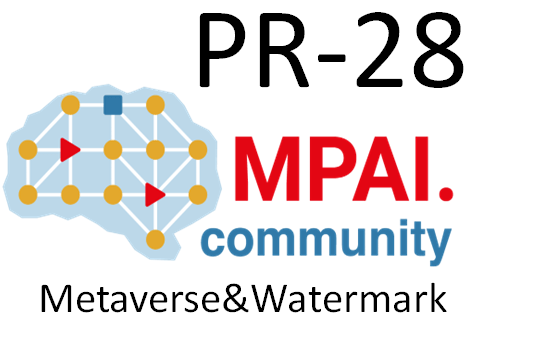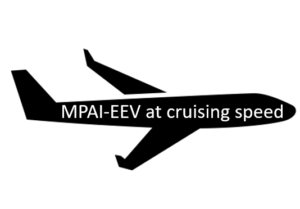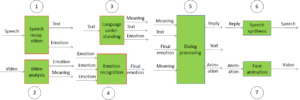Geneva, Switzerland – 25 January 2023. Today the international, non-profit, unaffiliated Moving Picture, Audio and Data Coding by Artificial Intelligence (MPAI) standards developing organisation has concluded its 28th General Assembly (MPAI-28) approving the Neural Network Watermarking (MPAI-NNW) Technical Specification, the MPAI Metaverse Model (MPAI-MMM) Technical Report, and the 2023 program of work on the Metaverse.
MPAI-28 has approved for publication the following two documents:
- Neural Network Watermarking (MPAI-NNW). Draft Technical Specification providing methodologies to evaluate the performance of neural network-based watermarking solutions in terms of imperceptibility, robustness, and computational cost. Further information from
| YouTube video | Non-YouTube video | MPAI-NNW |
- MPAI Metaverse Model (MPAI-MMM). Draft Technical Report, a document outlining a set of desirable guidelines to accelerate the development of interoperable Metaverses. The online presentation of the draft version of this document is available at
| YouTube video | Non-YouTube video | The MPAI Metaverse Model |
MPAI has also approved the 2023 program of work related to the MPAI Metaverse Model:
- Functionality Profiles referencing MMM functionalities, not technologies.
- Metaverse Instance Architecture with the functions and data types of the building blocks.
- Functional requirements of the identified data types.
- Table of Contents of the Common Metaverse Specifications.
- Initial Common Metaverse Specifications that includes MPAI Technologies.
MPAI is continuing its work plan comprising the following Technical Specifications:
- AI Framework (MPAI-AIF). Standard for a secure AIF environment executing AI Workflows (AIW) composed of AI Modules (AIM).
- Avatar Representation and Animation (MPAI-ARA). Standard for generation and animation of interoperable avatar models reproducing humans and expressing a Personal Status.
- Context-based Audio Enhancement (MPAI-CAE). Standard to describe an audio scene to support human interaction with autonomous vehicles and metaverse applications.
- Multimodal Conversation (MPAI-MMC). Standard for Personal Status generalising the notion of Emotion including Cognitive State and Social Attitude.
The MPAI work plan also includes exploratory activities, some of which are close to becoming standard or technical report projects:
- AI Health (MPAI-AIH). Targets an architecture where smartphones store users’ health data processed using AI and AI Models are updated using Federated Learning.
- Connected Autonomous Vehicles (MPAI-CAV). Targets the Human-CAV Interaction Environment Sensing, Autonomous Motion, and Motion Actuation subsystems implemented as AI Workflows.
- End-to-End Video Coding (MPAI-EEV). Extends the video coding frontiers using AI-based End-to-End Video coding.
- AI-Enhanced Video Coding (MPAI-EVC). Improves existing video coding with AI tools for short-to-medium term applications.
- Server-based Predictive Multiplayer Gaming (MPAI-SPG). Uses AI to train neural networks that help an online gaming server to compensate data losses and detects false data.
- XR Venues (MPAI-XRV). Identifies common AI Modules used across various XR-enabled and AI-enhanced use cases where venues may be both real and virtual.
As we enter the year 2023, this is a good time for legal entities supporting the MPAI mission and able to contribute to the development of standards for the efficient use of data to join MPAI.
Please visit the MPAI website, contact the MPAI secretariat for specific information, subscribe to the MPAI Newsletter and follow MPAI on social media: LinkedIn, Twitter, Facebook, Instagram, and YouTube.




